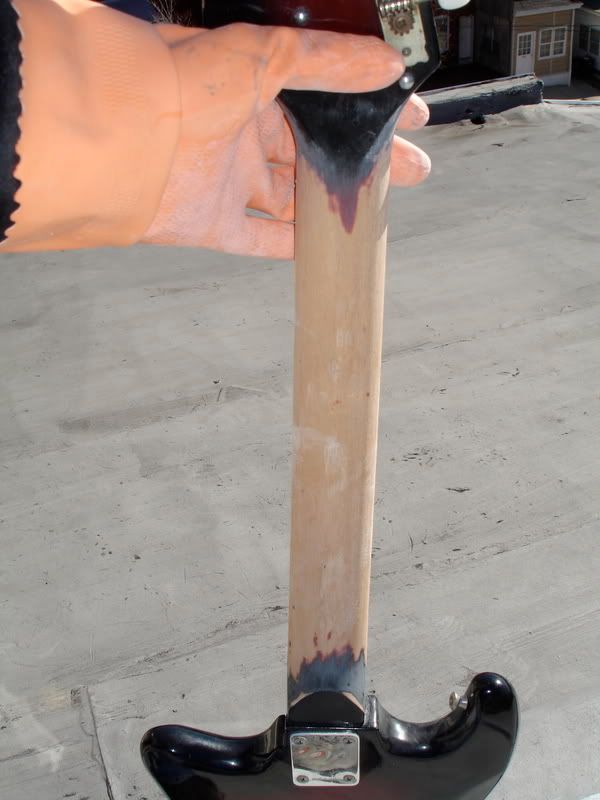Sanding guitar necks

Jam10
Posts: 654
Has anybody here ever sanded down their guitar neck to get the finish off and have a nice smooth feel to the neck. On my Les Paul I find that the neck gets very sticky when sliding up and down the neck because of the finish on it. I also find the neck pretty big so I wouldn't mind thinning the neck out a bit. Do all Les Paul necks have the lacqur finish on them?
I don't know if I should mess with the neck of my guitar because it is a 98 Studio, but at the same time I want a better feeling neck!!!!!! What should I do?
I don't know if I should mess with the neck of my guitar because it is a 98 Studio, but at the same time I want a better feeling neck!!!!!! What should I do?
Post edited by Unknown User on
0
Comments
-
i've read about people using micromesh to get rid of the tacky feeling.
http://www.google.ca/search?hl=en&q=micromesh+guitar+neck&btnG=Search&meta=
as for reprofiling the neck, that's a little more advanced, like take to a pro advanced.
people take the finish off all the time. once you're down to bare wood, you're exposing the neck to greater risk of warping due to moisture. keep that in mind. lots of people do it though and then oil the wood.
i've done that to a telecaster that had a thicker poly finish that had started to chip off severely. but i didn't really take any wood off. just the finish. but of course i can just buy a new neck if it goes south. not so the les paul from a practical perspective.0 -
Sure can!
Like exhausted said, you can break the gloss on the finish with micromesh paper, or fine sandpaper.
I just did one of my guitars a few weeks ago. I sanded the neck down by glueing some sandpaper to a glove and playing it for a while.


Worked great! BUT, it's not for everyone. I took the whole profile down on that neck.
As far as changing the profile on a Les Paul Studio, it certainly is possible, and if you really love the guitar then do it, but I think I'd look into selling it and trading it first.
I don't like the thick necks on Pauls, and I've reprofiled them before, but I ended up getting a Les Paul Classic 1960's profile.
Like this: http://cgi.ebay.com/99-Gibson-Les-Paul-Classic-NO-RESERVE-Free-Shipping_W0QQitemZ220234495776QQihZ012QQcategoryZ2384QQssPageNameZWDVWQQrdZ1QQcmdZViewItem
You can pick one up for around 1200 bucks used. I think they're around $2000 new but they don't have great resale so I would look for a used one.
Great player's guitar. Built the same as a Standard, just not as fancy.
The neck is slimmer and I love playing that. The pickup in the bridge is a 500T and too hot for me in the stock ones, but I threw some pickups in there and it's a great guitar.
Think about that before you sand the finish on the Studio because you may lose some resale on it if you decide to trade.
If you're serious about playing, then it's worth doing something, because you want your guitar to fit your hands!Be kind, man
Don't be mankind. ~Captain Beefheart
__________________________________0 -
Just be aware that sanding the neck down can also make it loose some integrity.
Warmoth: http://www.warmoth.com/paint/paint.cfm?fuseaction=necks
OTHER NECK FINISH INFO:
To Finish or Not to Finish?
All our necks are dipped in an oil based penetrating sealer which is compatible with virtually all secondary finishes. This provides enhanced stability; however, it is not adequate protection for playing. We strongly recommend you apply a hard finish to all Maple, Mahogany, and Koa necks. Oils do not validate our warranty requirements.
We understand the attraction of raw or lightly oiled necks. They feel fast and are not sticky. Unfortunately, they are much more susceptible to moisture related warping and twisting. Our experience is that hard finished necks seldom warp. Less than 1 out of 200 (0.5%) are returned for warpage. Raw or oiled necks don't fare as well. About 10% are rendered useless from the torture. The more acidic your perspiration, the higher the odds are against you.
If you must play a raw neck, that's cool; it's ok. A neck is just a tool. Just be aware of the risk. If yours does the pretzel act, we don't want to hear about it.
For a valid warranty, a hard finish must be sufficiently thick to completely cover the wood. That means no wood is exposed and you are actually playing on the finish, not the wood. Now, it does not matter to us who applies the finish. Of course we would like to do the finish for you, but if you choose to do it yourself or have it done elsewhere the warranty is still valid.♫ ♫ ♫ ♫ ♫ ♫ ♫ ♫ ♫ ♫ ♫ ♫ ♫ ♫ ♫ ♫ ♫ ♫ ♫ ♫ ♫ ♫ ♫ ♫ ♫ ♫ ♫ ♫
<b><font color="red">CONTACT ME HERE</font>: www.myspace.com/ianvomsaal</b>
♫ ♫ ♫ ♫ ♫ ♫ ♫ ♫ ♫ ♫ ♫ ♫ ♫ ♫ ♫ ♫ ♫ ♫ ♫ ♫ ♫ ♫ ♫ ♫ ♫ ♫ ♫ ♫0 -
^ True that!
It won't compromise anything if you scuff up the finish a bit, but if you take the finish off to bare wood, you should put something on there.
If you were going to scuff it up, try 300 grit sandpaper, then 600 grit , then 1000 grit paper. Won't take long.
If you take all the finish off, Tung oil, or Gun oil works pretty well as a new finish. I like that finish on a neck and have used it quite often. You can always touch that up as time goes by.
If you REALLY sand the neck down, stop if you see the truss rod!!!!
After long thought on this subject with a glass of a rather nice red wine, I don't think it's worth it to re-profile the neck. By the time you pay to do that, you could get a Classic or something else with a slimmer neck. Also try Heritage Guitars. Made in the old Gibson plant and they're great. Some of them have slimmer profile necks, too.Be kind, man
Don't be mankind. ~Captain Beefheart
__________________________________0 -
I'm not a fan of the thick necks either. This is much better. Now if they could just do something about the fact it weighs 10lbs, i would play it in a heartbeat. To the big dudes, i know the difference between that and the new chambered ones is not a big deal (i think it's about 2.5lbs), but after a couple of hours i notice it.who's_pearljam? wrote:Like this: http://cgi.ebay.com/99-Gibson-Les-Paul-Classic-NO-RESERVE-Free-Shipping_W0QQitemZ220234495776QQihZ012QQcategoryZ2384QQssPageNameZWDVWQQrdZ1QQcmdZViewItem
The neck is slimmer and I love playing that. The pickup in the bridge is a 500T and too hot for me in the stock ones, but I threw some pickups in there and it's a great guitar.
Think about that before you sand the finish on the Studio because you may lose some resale on it if you decide to trade.
If you're serious about playing, then it's worth doing something, because you want your guitar to fit your hands!
Cool post. Thanks for sharing.0 -
Lot's to think about here guys. Thanks. I want to get a Strat or Tele pretty soon as well so maybe that's all I need is different guitars for different sounds.0
-
Just try this - it's what I use to help smooth the feel of my necks (and strings) - always works like a charm.Jam10 wrote:Has anybody here ever sanded down their guitar neck to get the finish off and have a nice smooth feel to the neck. On my Les Paul I find that the neck gets very sticky when sliding up and down the neck because of the finish on it. I also find the neck pretty big so I wouldn't mind thinning the neck out a bit. Do all Les Paul necks have the lacqur finish on them?
I don't know if I should mess with the neck of my guitar because it is a 98 Studio, but at the same time I want a better feeling neck!!!!!! What should I do?
"Eliminates drag from strings and back of neck" http://www.musiciansfriend.com/product/Fingerease-Guitar-String-Lubricant?sku=420450♫ ♫ ♫ ♫ ♫ ♫ ♫ ♫ ♫ ♫ ♫ ♫ ♫ ♫ ♫ ♫ ♫ ♫ ♫ ♫ ♫ ♫ ♫ ♫ ♫ ♫ ♫ ♫
<b><font color="red">CONTACT ME HERE</font>: www.myspace.com/ianvomsaal</b>
♫ ♫ ♫ ♫ ♫ ♫ ♫ ♫ ♫ ♫ ♫ ♫ ♫ ♫ ♫ ♫ ♫ ♫ ♫ ♫ ♫ ♫ ♫ ♫ ♫ ♫ ♫ ♫0 -
ianvomsaal wrote:Just try this - it's what I use to help smooth the feel of my necks (and strings) - always works like a charm.
"Eliminates drag from strings and back of neck" http://www.musiciansfriend.com/product/Fingerease-Guitar-String-Lubricant?sku=420450
^^^ This is an excellent suggestion, I recommend it.If idle hands are the devil's workshop, he must not be very productive.
7/9/06 LA 1
7/10/06 LA 2
10/21/06 Bridge 10
Categories
- All Categories
- 149.1K Pearl Jam's Music and Activism
- 110.2K The Porch
- 282 Vitalogy
- 35.1K Given To Fly (live)
- 3.5K Words and Music...Communication
- 39.3K Flea Market
- 39.3K Lost Dogs
- 58.7K Not Pearl Jam's Music
- 10.6K Musicians and Gearheads
- 29.1K Other Music
- 17.8K Poetry, Prose, Music & Art
- 1.1K The Art Wall
- 56.8K Non-Pearl Jam Discussion
- 22.2K A Moving Train
- 31.7K All Encompassing Trip
- 2.9K Technical Stuff and Help


